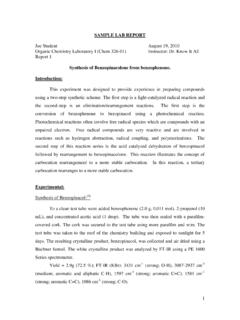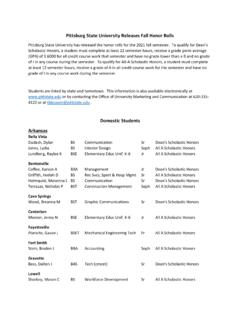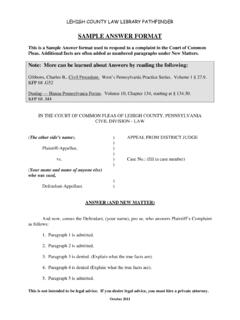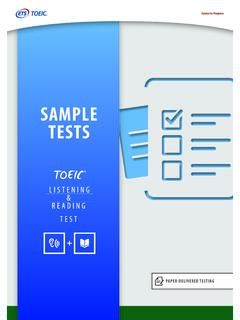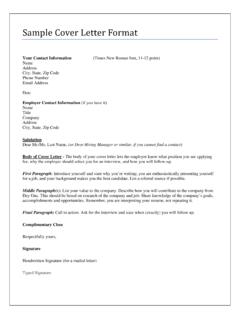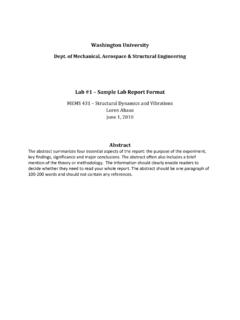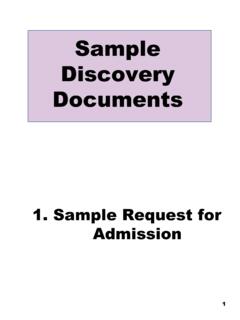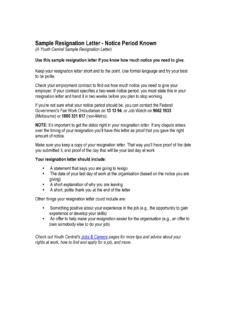Transcription of A Template Showing How to Use APA Format for Research ...
1 Running Head: A Template Showing HOW TO USE APA Format 1 A Template Showing How to Use APA Format for Research Papers and Other Writing Assignments Firstname Lastname Pittsburg State University A Template Showing HOW TO USE APA Format 2 Abstract The abstract states the question the paper was designed to answer and reports the most important findings. One way to write your first draft of the abstract is to write one sentence reporting the main point or most important idea of each major section of the paper. If you have organized your paper well, that will create an abstract that gives readers a rapid overview of your paper. Typically, plan to include a sentence about why the question or Research is important (introduction), your Research question, a brief statement about your Research method (for an empirical Research report) or the types of sources you used (for source-based Research ), a one-sentence statement of your most important results or findings, your one-sentence answer to your Research question, and one additional sentence about how the results are useful.
2 The abstract should be 100-250 words. Keywords: sample paper, APA Format , Research report A Template Showing HOW TO USE APA Format 3 A Template for APA Formatted Research Papers The whole title of the paper is restated at the top of page three, followed immediately by the first line of the introduction with no extra blank lines in between. Notice that the introduction does not have a heading that says introduction. The introduction is the only section of the Research report that does not have its own heading. You will probably also notice that the content of this sample paper will seem a little disjointed because its goal is both to teach APA Format (which can be used for any type of writing assignment) and to provide an example of how to organize a typical Research report. Obviously, a real Research paper would not have two purposes, and so it would not seem disjointed in the same way that this does.
3 Remember that every document you write for academic or professional, non-literary purposes can be understood as the answer to a question. Thinking about writing that way will make it much easier to develop and focus your content, so it is worth the extra time and effort needed at the beginning of the process to figure out what question your paper is designed to answer. Although every piece of academic or professional writing can be understood as answering a question (and is easier to write if you think of it that way), in writing a Research paper, your Research question is an absolutely essential starting point. Research is the activity of gathering the information needed to answer a Research question and then using that information to build the answer. Therefore, Research can only exist in response to a Research question. The purpose of the introduction (which you should always write last, after the rest of the paper is finished) is to provide a meaningful context for the question your paper is designed to answer and to state your one-sentence answer to the question.
4 The one-sentence answer to your question is your paper s thesis. In theory, you could use the introduction to state the question and then state the answer in the conclusion (instead of putting the answer in the introduction). A Template Showing HOW TO USE APA Format 4 But although it is technically acceptable to put your thesis in the conclusion instead of in the introduction, there is no benefit to you or your readers in not stating your thesis in the introduction, and there are many disadvantages in leaving your readers in ignorance of your main point until the very end. Documenting Sources in APA Format Research is both the activity of gathering the information needed to answer a Research question and the work of building the answer to the question from the information you gathered. Therefore, a Research paper has three goals: 1) to state the one-sentence answer to the question, 2) to provide fully-developed support for your answer by presenting your readers with both the most significant ideas and information from your sources and your own reasoning and explanation, and 3) to demonstrate the quality of the information you used by documenting your sources.
5 Although many styles of source citation exist, they all share the basic goals of distinguishing between your own ideas and the ideas or information you got from your sources (and which ideas come from what sources) and giving readers enough information about the sources so that readers can go read the sources for themselves. APA uses three tools to accomplish those goals: the references list, in-text (parenthetical) citations, and attribution phrases. The references list in APA Format appears at the end of the document, starting on a new page with the word References at the top of the page. References list entries are alphabetized by author name, as shown in the sample references list at the end of this document. That list provides sample reference list entries for a book, a journal article, and blog post. The retrieved from link in the blog post entry is a real link that will take you to more information about citing other types of online sources.
6 In creating the references list A Template Showing HOW TO USE APA Format 5 entries, pay special attention to the Format of author names, location of the date of publication, capitalization of titles, and the absence of quotation marks around article titles. A complete in-text citation in APA Format consists of author s last name, year of publication, and when using a direct quote or information found in only one location in a source page number(s) or other location information. In all of the disciplines that prefer APA to other source citation systems, the general rule when using information and ideas from sources is to put the source material in your own words. Use direct quotes rarely, and when using direct quotes, quote the least possible amount of text from the source. When quoting, always build the quoted material into a sentence of your own (Zepernick, 2015, p.)
7 12), and immediately indicate the source of the quoted material using an in-text citation like the one shown here. (Note that with the exception the APA Style blog posts by Lee and McAdoo, the sources shown here are for illustration only and do not represent actual sources that really exists.) When an in-text citation appears at the end of a clause or sentence, closing punctuation goes after the in-text citation (Zepernick, 2015, p. 12). Page numbers or other location information are required when using direct quotes, but also consider providing page numbers/location information any time you are using information that readers are likely to want to track back to verify or use in their own work. When you are using ideas from multiple sources, it is often helpful to readers to identify the source of a specific idea or piece of information at the beginning of the clause or sentence rather than at the end.
8 An attribution phrase (a group of words that attributes ideas to their source) allows you do that by naming the source directly in your text instead of in a parenthetical citation. McAdoo (2010) provides several examples of both in-text citations and attribution phrases. In the preceding sentence, the words McAdoo provides are the attribution phrase, and the in-text, which appears immediately after the author s name, now includes only the year of A Template Showing HOW TO USE APA Format 6 publication. Zepernick (2015) points out that you can also use attribution phrases to introduce quoted material (p. 20), as long as you remember to include the page number immediately after the quote. When citing sources in APA, you need to be aware that different numbers of authors are treated differently in in-text citations. As Zepernick (2015) points out, this is the single most difficult part of APA Format for first-time users, but it is quite easy to master with a modest investment of attention to detail and a willingness to look things up.
9 The in-text citation for a work with one author (Zepernick, 2015) or two authors (Smith & Jones, 2015) will appear in the same Format throughout the text. Smith and Jones (2015) indicate that the ampersand (&) is used for two or more authors in parenthetical citations, but not as in this sentence--when the authors names are used in attribution phrases. When a source has three to six authors, the first use of the source lists all the authors in the in-text citation (Jones, Chen, & Wilson, 2015); subsequent references to that source use only the first author et al. (Jones et al., 2015). If a source has six or more authors, use the first author et al. Format for every reference to that source, including the first one. Page Layout and Formatting When instructors ask for APA Format , sometimes they are referring only to the APA system for documenting sources (the references list, in-text citations, and attribution phrases).
10 In that case, the instructor will provide specific requirements for page layout and other formatting issues (or will encourage you to follow your best judgment about formatting). However, sometimes the instructor wants you to follow APA s formatting guidelines for page layout, title page, abstract, running head, and use of section headers as well. As a general rule, a document in APA Format will be double-spaced with no extra blank lines between paragraphs, page A Template Showing HOW TO USE APA Format 7 numbers and a shortened version of the document title will appear in a running head at the top of the page, the first page (title page) will have a slightly different header (as shown on the title page of this document), first level section headers for all sections after the introduction will be in bold face with no extra space before or after, and the references list will start on a new page after the last page of the main text.
